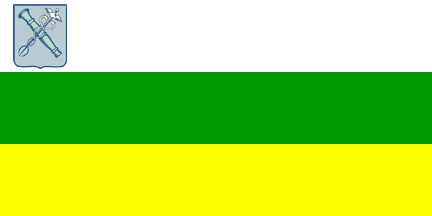
Last modified: 2021-07-24 by valentin poposki
Keywords: novozybkovo |
Links: FOTW homepage |
search |
disclaimer and copyright |
write us |
mirrors
 António Martins-Tuválkin, 6 June 2010
António Martins-Tuválkin, 6 June 2010Some 250 kilometers southwest of Moscow in the Bryansk region,
a yellow, green and white flag now flies above the town hall.
In the top left-hand corner cannabis is depicted, a plant
more widely known for its hallucinogenic qualities.
For Novozybkovo, a quiet provincial town of 43 000 that
suffered greatly from the nuclear disaster at Chernobyl, the plant
is a symbol of a long-gone glorious age when the town was a vital
cog in the country’s navy.
In the 18th and 19th century, Novozybkovo was a major supplier of
hemp, the tough coarse fiber of the cannabis plant. A factory in
the town supplied the Russian Navy with the hemp used for ropes,
and the plant was honored when it was placed on the town’s coat of
arms in the first quarter of the 19th century. Russia’s defeat in
the Crimean War in 1856 had a crippling effect on the industry,
and the decimated Russian Navy’s need for hemp died out, said Oleg
Dunayev, who works at a local museum and helped the town pick the
flag’s design.
Hemp was cultivated until the start of the 20th century but died
out completely with Stalin’s campaign to set up collective farms.
The only protests in Novozybkovo, city officials said,
have been from local Communists. They didn’t like the color of the
flag and wanted it to be red.
Phil Nelson, 05 April 2003,
quoting and resuming from
Kevin O’Flynn / Moscow Times
The flag, approved on 2002.12.26 by local parliament law No. 2-259, shows
the hemp plant mentioned in the 2003 _Moscow Times_ article as part of an
emblem consisting of a Samnitic shield Argent (edged for contrast on the
flag) charged with a caduceus Or crossed over a (hardly recognizable)
sheaf of hemp Vert. The flag is a 1:2 horizontal triband of white, green
and yellow, attached with co credit to User:Panther at
Wikimedia Commons
António Martins-Tuválkin, 6 June 2010